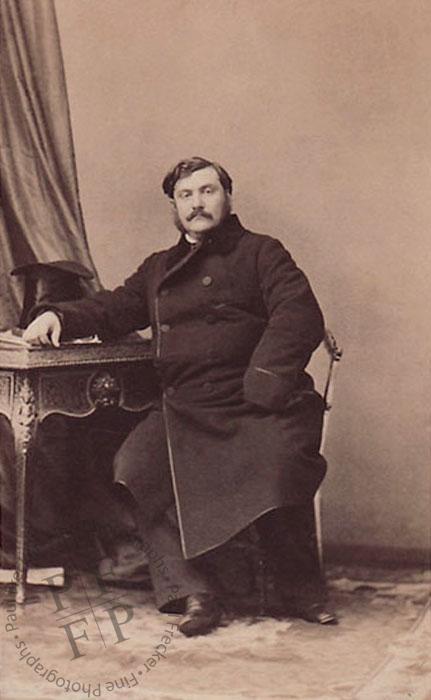Gioacchino Napoleone Pepoli
(1825-1881)
Gioacchino Napoleone Pepoli was an Italian patriot, a politician and a man of letters. Through his mother Letizia Murat he was a great-nephew of the first Napoléon.
According to his obituary in the Times (4 April 1881): ‘Our Rome Correspondent writes under date March 28 – The Marchese Gioacchino Pepoli, whose name will be familiar to the readers of Farini’s “Lo Stato Romano,” and will ever hold a distinguished place among those who dedicated themselves from their earliest years, first to the work of accomplishing the unity of Italy, and then to her service, died at Bologna at 3 o’clock on the morning of the 26th. He was born in the year 1825, son of the Marchese Guido Taddeo Pepoli, by his marriage with the Princess Letizia Murat, daughter of General Joachim Murat, King of Naples. At the age of 21 he joined the revolutionary party, and on the death of Gregory XVI, he, together with Minghetti, Janari and Marchetti, drew up that celebrated address to the Conclave, asking for the reforms desired, which is described as the active initiation of the Italian movement in the Pontifical States. In 1846 he headed the Civic Guard in the repulse given by the Bolognese at the Montagnola to the Austrian soldiers under General Walden. Antagonistic to the Pontifical Government, he became, after the return of Pius IX from Gaeta, the active head of the Liberal party in Bologna, and his house was the rendezvous of all who strove for the independence and desired the unity of Italy. In 1853 he went to Paris to use his influence with his relation, Napoleon III, in favour of the Italian cause, and at that time wrote articles on the subject which appeared in the Revue des Deux Mondes. He was more or less directly concerned in all the important political negotiations between the Government of Victor Emmanuel and the Emperor of the French. On the breaking out of the war of 1859 he became a member of the provisional government of Bologna, holding first the portfolio of Finance and then that of Foreign Affairs; and after the plébiscite of the 12th of March, 1860, which united the Emilia to the constitutional government of Victor Emmanuel, he held the portfolio of Finance under the dictatorship of Farini. On the liberation of Umbria he was named commissary-general of that province. In 1862 he became a member of the Italian Government, holding the portfolio of Agriculture and Commerce in the Rattazzi Administration; and when, in 1863, Russia acknowledged the Kingdom of Italy, he was sent as ambassador to St Petersburg. He resigned that post in 1864, in order to return to his place in the Chamber and take part in the debate on the Franco-Italian convention of the 15th of September, and continued actively occupied in Parliamentary matters until, at the end of 1866, he was sent as Minister-Plenipotentiary to Vienna. In 1868 he was made a senator of the kingdom, and from that time Pepoli devoted himself entirely to the amelioration of the condition of the working-classes. In Parliament he sat on the Left Centre, and his ardent advocacy of the repeal of the grist tax was greatly influential in finally carrying that Bill through the Senate. It is justly said that through his death Italy loses one of her most laborious and liberal citizens, the King an affectionate and faithful friend, and the working classes a most sincere and zealous guardian of their interests and welfare. He married, at the age of 19, his cousin, Princess Frederica Hohenzollern Sigmaringen, who survives him.’

